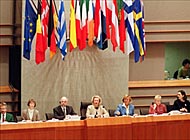The next moves: How far will Switzerland open up?

Now that Swiss voters have approved the bilateral accords with the European Union, attention is likely to shift to Switzerland's relations with Europe and rest of the world.
A leading pro-European Swiss official told swissinfo that the approval of the bilateral accords means that two issues are likely to dominate Swiss politics over the next few years: whether and when Switzerland should join the European Union and the United Nations.
But there are still plenty hurdles to be overcome, even in terms of ensuring the bilateral accords are ratified. Parliaments of all 15 EU states now have to ratify the accords and, if they do, they will come into effect in January.
The accords include a section on the free movement of people – and this may yet prove a controversial issue in a few of the 15 EU countries.
Different ratification procedures may also come into play. Belgium, for example, has a relatively complicated ratification process, while Denmark will be applying a simpler procedure.
The European Parliament approved the accords in April, sending a clear signal to both the Swiss people and the individual parliaments. Analysts say there appears to be no concrete opposition to the bilaterals in any of the EU countries, but neither is there a homogenous ratification timetable.
Any unforeseen delay could affect the introduction of Switzerland’s heavy goods vehicles tax which would be used to help offset the effects of the anticipated increase in heavy trucks travelling through Switzerland.
Ratification of the treaty leaves open much larger questions which are likely to dominate Swiss politics over the next few years, such as if and when Switzerland should join the European Union or the United Nations.
A referendum is likely to be held on UN membership. The Swiss people rejected such a move in a vote in 1986, but the Swiss government is represented and active in many UN bodies and agencies.
On the issue of full EU membership, the country is sharply divided. It is the government’s stated aim to take Switzerland into the EU, but the timing of any such move is likely to be a key factor. The opposition is expected to be much fiercer and more concerted than it was over the bilateral accords.
The government still remebers the humiliation it suffered on December 6, 1992, when the people rejected membership of the European Economic Area in what would have been a tentative move towards Europe.
Christoph Blocher, the influential leading figure of the right-wing People’s Party, has already made it clear where it will draw the line. A qualified yes to the bilateral accords, but an absolute no to EU membership.
For political and technical reasons, any attempt to get EU membership past the Swiss people is going to take at least seven to ten years, analysts say.
Many people will watch to see the effects of certain of the bilateral accords, including the free movement of labour, wage policy, transport and the environment, before committing themselves to further EU integration.
European Union membership is still a political minefield, analysts say. The issues of Switzerland’s traditional neutrality and independence, the potential economic and political benefits of EU membership, will all come high up on the political agenda as the discussion mounts.
swissinfo with agencies

In compliance with the JTI standards
More: SWI swissinfo.ch certified by the Journalism Trust Initiative
You can find an overview of ongoing debates with our journalists here . Please join us!
If you want to start a conversation about a topic raised in this article or want to report factual errors, email us at english@swissinfo.ch.